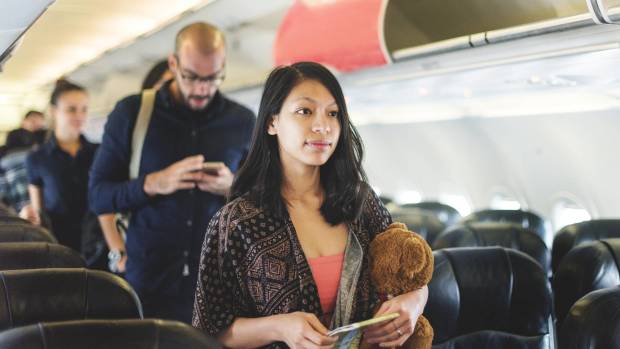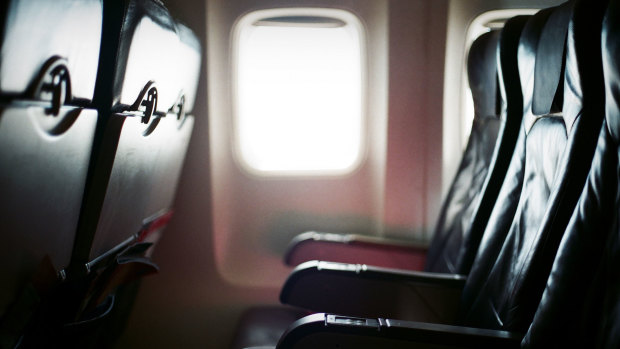
Air travelers have a right to certain expectations when they fly. Of course, it's no secret that it's not always an easy experience.
Any number of variables can be cause for a more stressful than anticipated journey. Among them are flight delays, lost luggage, long security lines and overbooked flights.
DON'T MISS: Iconic American retailer reportedly ready to file bankruptcy
The U.S Department of Transportation (DOT) has a clear and concise mission statement that serves as its guiding principle.
"To deliver the world's leading transportation system, serving the American people and economy through the safe, efficient, sustainable, and equitable movement of people and goods," it says.
With regard to air travel, this mission involves setting policy for U.S. airlines, including American Airlines (AAL) -), Delta Air Lines (DAL) -), Southwest Airlines (LUV) -), United Airlines (UAL) -) and JetBlue (JBLU) -).
The presence of untrained service animals on flights
One of the DOT's recent policy changes, aimed at increasing regulation of untrained service animals, has recently come under scrutiny for an unintended consequence of its implementation.
"In 2021, the U.S. Department of Transportation implemented new regulations that cracked down on the rise in airline passengers traveling with untrained emotional support or service animals," wrote Channing Reid for Simple Flying. "Since the new rules took effect, several people with disabilities have reportedly encountered more trouble traveling with their service animals."
The new rules were implemented in an effort to crack down on passengers who had been questionably classifying their untrained pets as emotional support animals.
But those new regulations, including burdensome requirements for filling out complex forms before flights, have complicated matters for people with serious physical disabilities such as impaired vision.
"Visually impaired people have notably suffered from the recent difficulty of being permitted on aircraft with their service animals," Reid wrote. "The number of complaints has reportedly skyrocketed since the DOT carried out the new regulations."
Complaints from people with disabilities about flying with service animals have increased significantly since 2018, when 116 complaints were filed, according to a DOT graphic published by the Washington Post.
That was followed by 172 complaints in 2019 and 151 in 2020.
After implementation of the new regulations, those numbers increased to 464 complaints in 2021 and 451 in 2022.
"In interviews, blind people told The Washington Post that the regulations are so difficult to navigate that they are now hesitant to fly or are anxious about the experience," the Post reported. "Various organizations for the blind are calling for the forms to be changed or eliminated."

Getty Images
The Air Carrier Access Act
On Dec. 2, 2020, the DOT had announced it was revising its Air Carrier Access Act (ACAA) regulation on the transportation of service animals. It was to become effective Jan. 1, 2021.
Its intent was to ensure a safe and accessible air transportation system.
Following is the list of functions of what the DOT called, at the time, the "final rule."
Defines a service animal as a dog that is individually trained to do work or perform tasks for the benefit of a person with a disability;
No longer considers an emotional support animal to be a service animal;Requires airlines to treat psychiatric service animals the same as other service animals;
Allows airlines to require forms developed by DOT attesting to a service animal’s health, behavior and training, and if taking a long flight attesting that the service animal can either not relieve itself, or can relieve itself in a sanitary manner;
Allows airlines to require individuals traveling with a service animal to provide the DOT service animal form(s) up to 48 hours in advance of the date of travel if the passenger’s reservation was made prior to that time;
Prohibits airlines from requiring passengers with a disability who are traveling with a service animal to physically check-in at the airport instead of using the online check-in process;
Allows airlines to require a person with a disability seeking to travel with a service animal to provide the DOT service animal form(s) at the passenger’s departure gate on the date of travel;
Allows airlines to limit the number of service animals traveling with a single passenger with a disability to two service animals;Allows airlines to require a service animal to fit within its handler’s foot space on the aircraft;
Allows airlines to require that service animals be harnessed, leashed, or tethered at all times in the airport and on the aircraft;
Continues to allow airlines to refuse transportation to service animals that exhibit aggressive behavior and that pose a direct threat to the health or safety of others; and
Continues to prohibit airlines from refusing to transport a service animal solely based on breed.
Get exclusive access to portfolio managers and their proven investing strategies with Real Money Pro. Get started now.







